Photographs: Reuters Bikash Mohapatra
What difference can a year make in the life of a tennis player?
Quite a lot, it seems.
Take Ana Ivanovic as a case in point.
A year back, Ivanovic was living a dream. A straight sets win over Russian Dinara Safina in the French Open final gave the Serbian her first major title in her third final appearance.
Soon she would take over as the best player in the world, the No 1. And it seemed she seemed destined for greater glory.
However, the dream was ephemeral.
A year on, at the same venue, Roland Garros, Ivanovic was having nightmares.
She relinquished her title after self-admittedly suffering "dizzy spells" in a 6-2, 6-3 defeat by Belarussian teenager Victoria Azarenka on Sunday.
And the defeat summed up the Serbian's year in the intermediate period, throwing up statistics that hardly do anything to elevate the stature of a player who was heading for greatness only a year back.
Since her triumph in Paris last fall, Ivanovic suffered a slump (or shall we term it recession?) in form that witnessed her finish the year with a 11-9 singles record after the French Open (38-15) overall and her ranking plummet from number one to eighth in the world.
The statistic (11-9) becomes more morbid when one considers the fact four of those wins came during her title run at Linz, her only triumph in the past one-year.
Ivanovic's slump has continued this year as well, her singles record after the first five months reading a disappointing 18-7.
Will the Serbian be able to wrest this slump?
A good question that will find an answer in due course. But Ivanovic's case is the latest in the example of players whose careers have gone kaput after they had made their breakthrough at Roland Garros.
A comparative analysis of the four tennis majors suggest that the French Open might probably be 'jinxed'.
For many players (both male or female), who won their maiden Grand Slam title in the French capital, have failed to add another major trophy to their cabinets.
Statistics point out, in the Open Era (since 1969), 10 players who won their first major title at the Australian Open failed to replicate that success and had to retire with without further success.
That number comes down to six when one takes into account the All England Championships at Wimbledon and comes further down, to just four, when the year's final major, the US Open, comes under the scanner.
However, when one lists the players who failed to win another Slam, having sealed their maiden triumphs at the red clay in Paris, the number goes up to a whopping 16.
Thus, if the recent history is taken into consideration it would suffice to say that players have struggled the most to get past the "French Open jinx," the reasons nothwithstanding.
Will Ivanovic overcome this jinx?
We'll keep our fingers crossed and be patient. But here's a list of those who failed to do so.
Myskina remains a mystery
Image: Anastasia MyskinaPhotographs: Reuters
In 2004, Anastasia Myskina created history.
When she won the French Open beating compatriot Elena Dementieva 6-1, 6-2 in the decider, she became the first Russian woman to win a Grand Slam title, in what was the first all-Russian major final.
However, the title also marked the beginning of the end of her career.
A year later, she became the first defending champion in Paris to lose in the opening round when she was beaten in three sets by Spaniard Maria Sanchez Lorenzo.
For that matter, as a former champion, Myskina probably has the worst ever singles win/loss record at Roland Garros (11/7), with five first round exits.
The Russian did make it to the last eight stage at Wimbledon on two occasions (2005-06) but there was a gradual decline in her performance and she soon called it quits.
In the footsteps of Vilas, but...
Image: Gaston GaudioIn 2004, Gaston Gaudio became the first Argentine to win a Grand Slam title since Guillermo Vilas (in 1977) when he defeated compatriot and favourite Guillermo Coria 0-6, 3-6, 6-4, 6-1, 8-6 in an all-Argentine final.
The first set bagel also ensured he became the first man ever to win a major after losing the first 6-0.
For someone who came into the tournament ranked 44th, it was quite an achievement. In 2005, Gaudio won as many as five titles on the red dirt but thereafter went into oblivion.
When the Argentine (now ranked 359th) turned up at Roland Garros this year as a wildcard hoping to relive the best days of his life, he was sent packing (6-3, 6-4, 6-1) by Czech Radek Stepanek.
The 2004 triumph in Paris remains his lone major.
Mosquito bites, then gets bitten
Image: Juan Carlos FerreroPhotographs: Reuters
His record at Roland Garros, prior to his triumph in 2003, was impressive to say the least.
Juan Carlos Ferrero had made the semi-finals twice (in 2000 and 2001) and the final in 2002.
Coming into the French Open on the back of title triumphs in Monte Carlo and Valencia, Ferrero stayed true to form, beating Dutchman Martin Verkerk in straight sets in the final.
That year, he also reached the final at the US Open (losing to Andy Roddick) and won the Madrid Masters.
But then there was a five-year slump that witnessed his performaces decline.
Forget winning another major, Ferrero's first title win since that Madrid triumph came in Morocco earlier in April, after a gap of almost five-and-a-half years.
The highlight of Costa's career
Image: Albert CostaPhotographs: Reuters
Albert Costa's triumph in 2002 was that of a native.
Considered a good player, at least on the red dirt, the Spaniard had only a couple of big titles (at Barcelona and Hamburg) to showcase his credentials.
In fact, going into the French Open in 2002, he had not won a tour title since in three years.
But he shocked two-time defending-champion Gustavo Kuerten of Brazil in straight sets in the fourth round before taking out two-time finalist and compatriot Alex Corretja in the last four.
Despite his upset wins, it was Costa's rival in the final, another Spaniard Juan Carlos Ferrero, who was considered the favourite for the title.
However, Costa won 6-1, 6-0, 4-6, 6-3 to claim what was not only his maiden major title but also his final ATP title.
The following year, Costa spent a total of 21 hours and 15 minutes on court, winning four five-setters while defending his title before being knocked-out in a semifinal by eventual champion Ferrero.
That defeat hastened the end of the Spaniard's career.
Moya's moment
Image: Carlos MoyPhotographs: Reuters
In 1997, Carlos Moya beat defending champion Boris Becker in the first round and the 1996 finalist Michael Chang in the semi-finals, to reach his first Grand Slam final at the Australian Open.
Though he lost in straight sets to American Pete Sampras, the Spaniard was considering a bright future prospect.
Many said it was a matter of time before he won a major title.
And Moya justified their faith a year later (1998), when he defeated fellow-Spaniard Alex Corretja in straight sets in the final.
The triumph marked Moya's zenith as a tennis pro and also started his gradual decline.
Eleven years on, the Spaniard hasn't reached another major final, let alone win one!
Majoli's win started her decline
Image: Iva MajoliPhotographs: Reuters
In the early nineties, Iva Majoli was considered a promising prospect, particularly on clay.
So it didn't surprise many when she upset an in-form Martina Hingis of Switzerland in straight sets (6-4, 6-2) to win the women's singles title at the French Open in 1997.
The loss ended Hingis's 37-match winning streak.
Majoli also reached the quarter-finals at Paris the following year but failed to reach the third round of any subsequent Grand Slam tournaments she played.
Her game then went through a steady decline.
Mus'terminator'
Image: Thomas MusterPhotographs: Reuters
Thomas Muster first hit the headlines in 1985 when he made it to the final of the French Open boys' singles.
The promise soon translated to performace, especially on clay.
After a horrific accident in 1989, Muster returned with a vengeance.
In 1993, he won as many as seven titles on his favoured surface. And two years later, the Austrian won 12 titles in 14 final appearances.
That year, between February and June, he won 40 successive matches on the red clay.
And that included a maiden major at the French Open, coming at the expense of former champion Michael Chang, the scoreline, 7-5, 6-2, 6-4, underlining the Austrian's dominance.
Muster had a 65-2 win-loss record on clay during 1995 and 46-3 in the following year, when he defended all his titles on clay save the one at Roland Garros.
The Austrian also reached the semi-finals of the Australian Open in 1997. But the 1995 French Open remained Muster's first and only Grand Slam singles title.
The highlight of an inglorious career
Image: Andr s G mezPhotographs: Reuters
He came from nowhere to win the title in 1990.
When the 30-year-old Ecuadorian faced 19-year-old Andre Agassi, in what was the first major final for both the players involved, it was hardly a final that aficionados were expecting.
Gomez had done precious little in a decade-long career and that made the American the favourite going into the match.
But Gomez seized the opportunity and came away with a 6-3, 2-6, 6-4, 6-4 win.
The Ecuadorian played for many more years but failed to add another major title to his kitty.
Where Michael learned to rock
Image: Michael ChangPhotographs: Reuters
He was an unlikely winner.
In 1989 no one expected Michael Chang to win the French Open.
But the American edged past three-time champion Ivan Lendl in the fourth round in an epic five-set encounter and then went on to defeat Stefan Edberg 6-1, 3-6, 4-6, 6-4, 6-2 in the final.
That made him, at the age of 17 years and 3 months, the youngest male player ever to win a Grand Slam title and also the first American to win the men's singles title since Tony Trabert in 1955.
Chang reached three further finals in Grand Slams, including a straight sets loss to Austrian Thomas Muster in the 1995 Roland Garros final, but a second major title eluded him.
The last Frenchman to win in Paris
Image: Yannick NoahPhotographs: Reuters
It is a well-known fact that he is the last Frenchman to win the French Open.
But little-known is the fact that when Yannick Noah defeated defending-champion Mats Wilander in straight sets (6-2, 7-5, 7-6) in the final in 1983, he became the first Frenchman in 37 years to win the French Open.
The following year Noah partnered compatriot Henri Leconte to take home the doubles crown at Roland Garros.
But despite playing for many years following his momentary triumph is Paris, Noah failed to win another major title.
The Eastern bloc
Image: Mima Jau ovec and Virginia RuziciA 6-2, 6-7, 6-1 win over Romanian Florenta Mihai at the French Open final in 1977 gave Mima Jausovec her first major title.
A year later, she reached the final again but came up short against another Romanian, Virginia Ruzici.
And five years on, the Yugoslav made it to the title clash at Roland Garros for the third time in her career, losing 1-6, 2-6 to the legendary American Chris Evert.
Ruzici's lone major triumph came, as mentioned above, at the expense of Jausovec.
However, that year the Romanian did achieve the double, teaming up with Jausovec (you guessed it right) to win the women's doubles title.
The Italian job
Image: Adriano PanattaPhotographs: Reuters
Adriano Panatta literally rose from the ashes.
Having saved a match point in the first round against Czechoslovakian Pavel Hutka, the Italian defeated American Harold Solomon 6-1, 6-4, 4-6, 7-6 in the final to win the coveted title in 1976, making him till date the last man from his country (Italy) to have won a major title.
Panatta also has the distinction of being the only player to have defeated the legendary Bjorn Borg at the French Open -- the Swede had a 49-2 career record in Paris.
He achieved this feat twice in the fourth round in 1973 (7-6, 2-6, 7-5, 7-6), and in the quarter-finals in 1976 (6-3, 6-3, 2-6, 7-6).
He may have beaten Borg a second time in his career, but failed to add a second major title to his kitty.
Brit grit
Image: Sue BarkerSue Barker was consistent for a brief period of time and most of her successes came in that period.
In 1975, Barker first reached the semi-finals of the Australian Open.
A year later (1976), the Briton first won the German Open, beating Czech Ren ta Tomanova 6-3, 6-1 in the final.
And a few weeks later, Barker beat the same opponent in the final to win the French Open. That triumph remained the lone major title of her career.
In 1977, the Briton did reach the last four stage at both the Wimbledon and the Australian Open, but defeat in the same meant her major tally remained static.
Better late than never
Image: Andres GimenoPhotographs: Reuters
Some of you might have a counter argument as regards this choice.
Andres Gimeno won his maiden major title on the red dirt of Paris in 1972.
This Catalan had also reached the final of the Australian Open in 1969, only to lose to the legendary Rod Laver in straight sets.
But a 4-6, 6-3, 6-1, 6-1 win over Frenchman Patrick Proisy made him, at 35, the oldest male player to win the French Open a record he still holds.
And it is the age factor that brings us back to why some of you may disagree.
But the fact remains, Gimeno played for two more years, and eight more Slams, but failed to win again.

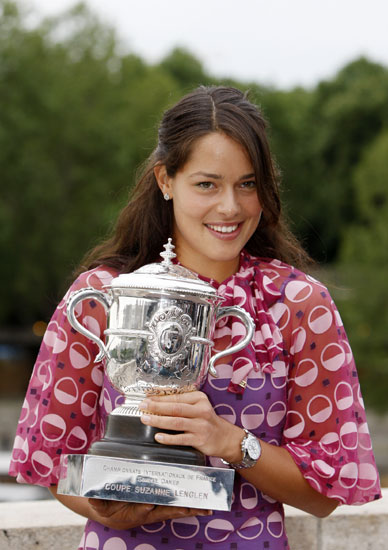
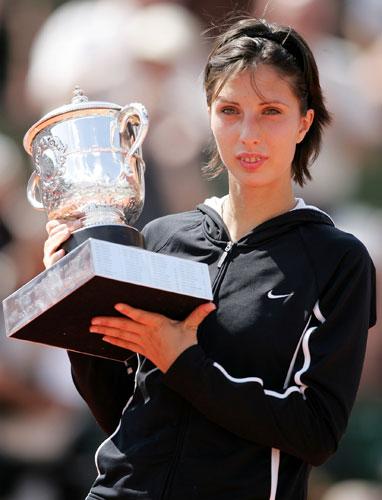
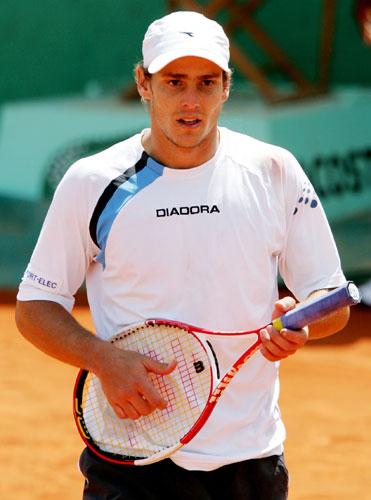
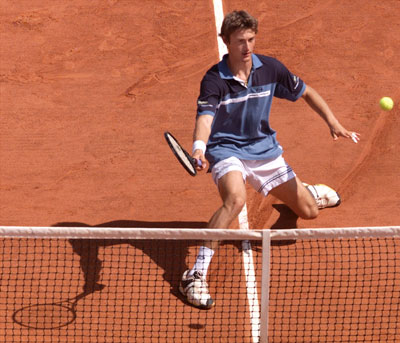
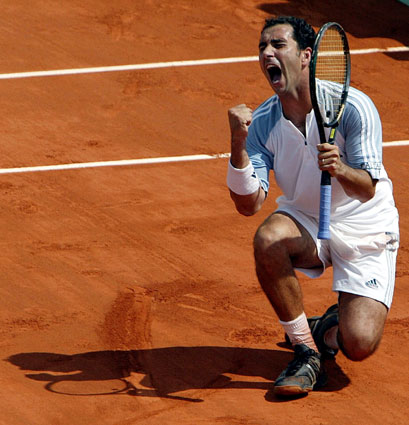
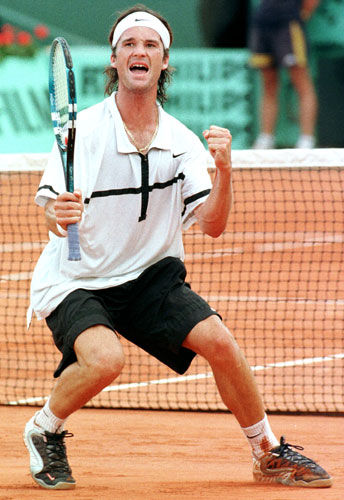
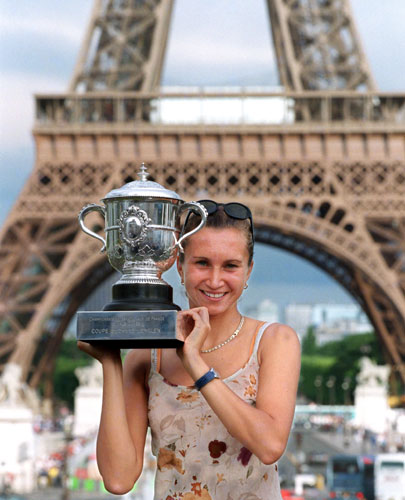
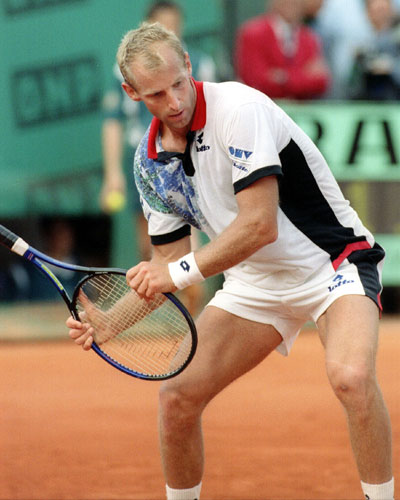
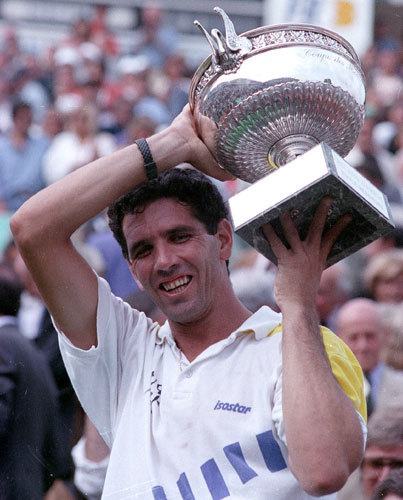
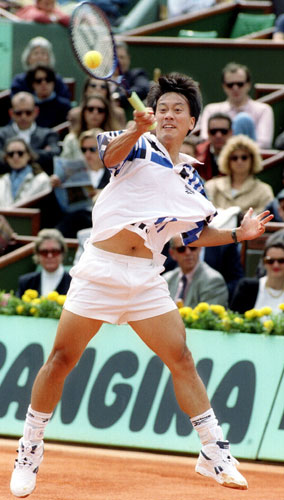
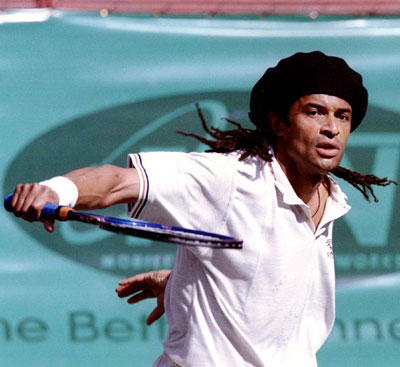
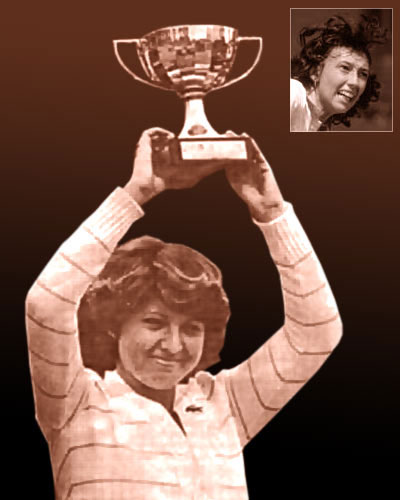
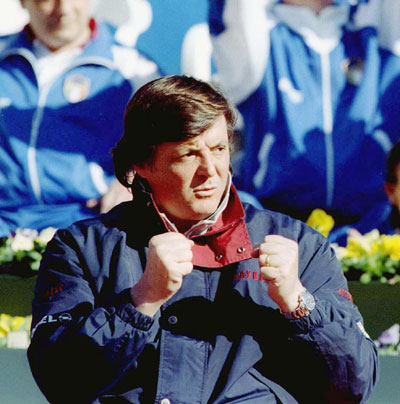
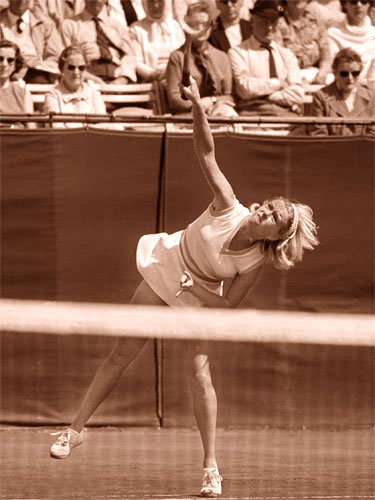
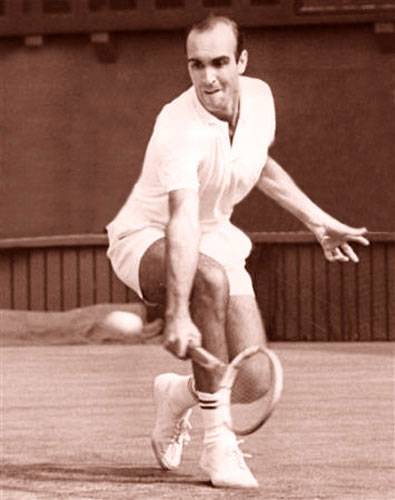
Comment
article